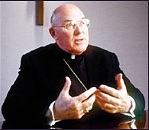Leadership Courage Series # 31
We’re looking at a ninth characteristic of courageous Christian leadership. A leader moves. She takes action.  Rather than taking a straw poll to see what the prevailing opinions are, a leader will go first. And sometimes this means going alone… for a while.
Rather than taking a straw poll to see what the prevailing opinions are, a leader will go first. And sometimes this means going alone… for a while.
It’s nothing special.
It what leaders do.
As we investigate going first, we’re reminded that Christ gave three distinct ministry gifts to the church: apostle, prophet, and evangelist to compliment that of the pastor-teacher [Eph 4:11]. Yet, since the Reformation, pastor-teachers have been leading in a vacuum. The overemphasis on shepherding and teaching has produced both the Church and the society that we have today.
Going first, I assert, includes restoring the apostolic, prophetic, and evangelistic graces to Christian leadership. Last time we considered the apostolic; what it brings to leadership and what’s lost when it’s absent.
So, what becomes of the Church when the prophetic is marginalized?
You get an indistinct, mushy, shallow, and disingenuously “nice” message week after week.  The trumpet blows an uncertain sound. [I Cor 14:8]
The trumpet blows an uncertain sound. [I Cor 14:8]
Sounds kinds like American Christianity, doesn’t it?
And where there’s no prophetic voice, there’s no distinctively Christian lifestyle either. Sin can thrive in an atmosphere like that.
Doesn’t it?
The prophetic grace brings clarity when the church and her leaders wobble and wander. The prophetic brings courageous correction. It is the scalpel that cuts between the diseased and the healthy tissue around it. It provides a clear word from God (or from God’s Word) when the Church is blurring the lines of biblical acuity.
Think about Nathan’s role in the life of King David [2 Sam 12:1-14]. Where might David’s arrogance, selfishness, and entitlement have taken him were it not for the timeliness, the clarity and the strength of the prophet’s rebuke?
When you mix the kind of power that many ministry leaders have with their human frailty disaster often results. When it does, innocents are hurt and the veracity of the Christian faith is undermined.
What if the prophetic voice was just as visible, authoritative, and influential in the Church in North America as the pastor-teacher has been?  Imagine if they stood side-by-side to mature the Church and to improve her efficacy in society.
Imagine if they stood side-by-side to mature the Church and to improve her efficacy in society.
Which of the high profile scandals might have been avoided?
More imperative, how much more mature, godly, and authentically Christian might the Church be today?
Allow yourself to consider the moral, spiritual, and ethical condition of American society if the prophetic had been as influential as the shepherd-teacher has for the last couple hundred years.
“Christ gave some to be apostles and some to be prophets…”
Since Christ has given them to the Church, don’t you wonder where they are?

I tell you where they are, many of us are writing sermons week after week, preaching at conferences and revivals, going to the hospital to visit the sick, visiting those incarcerated, those in nursing facilities, helping others to find their way, while losing our own. Not having quite time, not spending time alone with God just for ourselves, not to pray for a church member, not to hear a word to preach, but to say, “God here I am, show me my deficiencies, show me my stuff, show me my own short coming, show me my sin, that I to may repent, and gain strengthen for this journey. Where are they you ask? We are out doing the work of the ministry, we are out being busy, many busier than Jesus was, and that’s a dangerous place to be, for even Jesus found time for rest, and prayer, time to be alone with the Father.